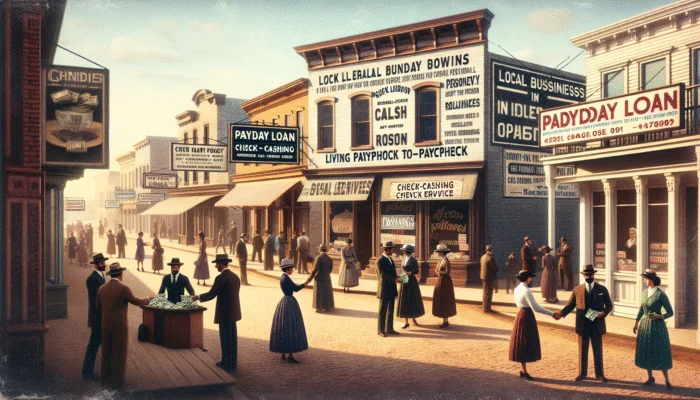Key Insights
- Origins: The history of payday loans in Texas dates back to the early 20th century, beginning with informal salary loans.
- Regulations: Legislative changes have shaped the payday lending landscape, focusing on consumer protection and lender accountability.
- Online Shift: The move to online platforms has made payday loans more accessible, though it raises regulatory challenges.
- Economic Impact: Economic conditions significantly influence the demand for payday loans, with higher usage during financial downturns.
What is the historical development of payday loans?

The origins of payday loans in Texas can be traced back to the early 20th century when local businesses began offering salary loans and check-cashing services to workers in need of quick cash. These early iterations were informal, often relying on personal relationships and trust rather than stringent regulations or formal agreements. The convenience of obtaining small amounts of money without the lengthy processes associated with traditional banks attracted many Texans, especially those living paycheck to paycheck. Overall, payday lending has become a recognized option for those seeking quick cash solutions.
What were the early beginnings of payday lending?
During this period, payday lending slowly gained traction as more individuals found themselves in financial distress, requiring immediate access to funds for unexpected expenses or emergencies. The practice spread across the state, fueled by an understanding of the unique financial challenges faced by many communities. By the late 20th century, payday lending had firmly embedded itself into the fabric of Texas’s financial landscape.
How have legislative changes impacted payday loans?
The landscape of payday lending in Texas has been significantly shaped by a series of legislative changes over the years. As the popularity of payday loans increased, so did concerns about predatory lending practices. Lawmakers began enacting regulations aimed at protecting consumers while balancing the interests of lenders. In 2001, the Texas Legislature passed the Texas Finance Code, establishing a framework for payday loans and requiring lenders to obtain a license.
What is the transition to online payday lending?

The rise of the internet has dramatically transformed the payday lending industry in Texas. Online payday lending emerged as a convenient alternative to traditional brick-and-mortar lenders, allowing consumers to apply for loans from home. This shift has made payday loans more accessible to a wider audience, particularly those in remote areas with limited access to physical lending institutions. The transition not only changed how consumers interact with payday lenders but also reshaped the industry’s overall framework.
What is the current state of payday loans in Texas?
How does the regulatory environment for payday loans look?
The regulatory environment for payday loans in Texas is designed to protect consumers while allowing lenders to operate within a structured framework. Texas law mandates that payday lenders must be licensed and adhere to strict guidelines concerning the fees and interest rates they can charge. This transparency empowers consumers to make informed choices about their financial options.
What are the popularity and usage trends of payday loans?

Payday loans continue to be a popular short-term borrowing option in Texas, particularly during times of economic uncertainty. The demand for payday loans often reflects fluctuations in economic conditions, with usage patterns increasing during periods of financial strain. Many Texans turn to payday loans to cover unexpected expenses when traditional credit sources are unavailable.
How do economic conditions impact payday loans?
The demand for payday loans in Texas is intricately linked to the state’s economic conditions. During economic downturns, individuals face unexpected financial challenges, leading to increased reliance on payday loans. Conversely, during periods of economic growth, the demand may decrease as consumers find themselves with more disposable income.
What expert insights can be provided on the evolution of payday loans in Texas?
What are some real-world examples of payday loan evolution?
Examining real-world examples of how payday loans have evolved in Texas reveals fascinating insights into industry shifts and consumer behavior. For instance, a local payday lender embraced technological advancements, allowing borrowers to apply for loans via a mobile app, which improved accessibility and customer satisfaction.
What actionable steps can borrowers take to navigate payday loan regulations?
Navigating Texas’s payday loan regulations can be overwhelming for both borrowers and lenders. Borrowers should start by familiarizing themselves with the state’s lending laws, which outline their rights and the obligations of lenders. Lenders must ensure compliance with all regulatory requirements to avoid legal repercussions.
What expert analysis can be provided on future trends in payday lending?
As the payday lending landscape in Texas continues to evolve, several trends are anticipated to shape the future of this industry. Technological advancements will likely play a pivotal role, with the integration of artificial intelligence enabling lenders to make more accurate assessments of borrower risk. Additionally, increased regulatory scrutiny may prompt lenders to enhance compliance measures.
How do economic factors influence payday loan usage?
The correlation between economic factors and payday loan usage in Texas is evident, as various metrics directly influence borrowing behavior. Understanding these dynamics is crucial for both lenders and policymakers to address borrowers’ needs effectively.
What consumer protection measures are in place, and how effective are they?
Consumer protection measures in Texas are designed to safeguard individuals who utilize payday loans. The establishment of the Texas Finance Code has been crucial in promoting fair lending practices. However, the effectiveness of these laws is continually being evaluated and may require adjustments to better serve Texas residents.
How do payday loans work in Texas?
What are the eligibility criteria for payday loans?
To obtain a payday loan in Texas, borrowers must meet specific eligibility criteria, including having a steady income and a valid bank account. Understanding these criteria is essential for prospective borrowers, as it helps them prepare the necessary documentation.
What is the typical loan process for payday loans?
The process of obtaining a payday loan in Texas is designed to be straightforward and efficient. Borrowers can apply for loans either online or in person, with many opting for the convenience of online applications. The typical process begins with the submission of personal and financial information, and approval can often be received within minutes.
What are the repayment terms and conditions for payday loans?
Payday loans in Texas come with specific repayment terms that borrowers must understand. Typically, the loan is expected to be repaid within a short timeframe, often aligning with the borrower’s next payday. Understanding these terms is critical, as failing to repay the loan on time can lead to additional financial burdens.
What are the alternatives to payday loans in Texas?
What are the available alternatives to payday loans?
While payday loans offer quick access to cash, they are not the only option available to Texans seeking financial assistance. Alternatives like personal loans from banks or credit unions often provide lower interest rates and longer repayment periods.
How do credit unions offer different loan options compared to payday loans?
Credit unions in Texas provide a range of loan options that differ significantly from traditional payday loans. They can offer more favorable rates and terms, helping borrowers avoid high fees associated with payday lending.
What are the benefits of using personal loans over payday loans?
Personal loans present several benefits that make them an attractive alternative to payday loans, including lower interest rates and longer repayment periods. This flexibility can help individuals avoid falling into debt cycles.
What consumer protection measures are in place for payday loans?
What protections are in place for payday loan borrowers?
Texas has established several consumer protection measures designed to safeguard payday loan borrowers from predatory practices. The Texas Finance Code requires payday lenders to be licensed and adhere to strict regulations regarding disclosure of loan terms.
How can borrowers report issues with payday loans?
Borrowers facing issues with payday loans can report concerns to the Texas Office of Consumer Credit Commissioner (OCCC), which oversees payday lenders and investigates complaints.
What are the consequences for lenders violating regulations?
Lenders found in violation of payday loan regulations in Texas may face significant penalties, including hefty fines and potential license revocation. These consequences emphasize the importance of adhering to established laws.
What are the research-backed benefits of payday loans in Texas?
What data-driven insights exist on payday loan benefits?
Research indicates several benefits associated with payday loans in Texas, highlighting their role in providing quick access to funds during financial emergencies. This rapid access can be lifesaving for individuals facing urgent expenses.
What evidence is there on the economic impact of payday lending?
Studies analyzing the economic contributions of payday lending in Texas indicate that this sector plays a significant role in enhancing financial services accessibility for low-income individuals. The industry also contributes to local economies by creating jobs.
How does consumer behavior influence the payday loan market?
Research on consumer behavior reveals intriguing insights into how individuals utilize payday loans. Many borrowers view them as a necessary financial tool, particularly in times of economic distress, though responsible management is crucial.
What trends in payday loan usage and market growth are observable?
Data on payday loan usage indicates evolving patterns that reflect broader economic and societal changes. Awareness of financial literacy is increasing, leading to a gradual shift in borrowing practices.
What does the future hold for payday loans in Texas?
What technological innovations are shaping payday lending?
Technological advancements are poised to significantly reshape the payday lending industry in Texas, enhancing efficiency and accessibility. The integration of mobile applications is streamlining the loan application process.
What potential regulatory changes could impact payday loans?
The regulatory landscape for payday loans in Texas is continually evolving, with potential changes that could have significant implications for both lenders and borrowers. Ongoing discussions regarding consumer protection may lead to stricter regulations.
How might consumer preferences shape the future of payday loans?
Shifting consumer preferences and increasing financial literacy levels are likely to influence the future of payday loans in Texas. As borrowers become more aware of the potential pitfalls, there may be a growing demand for ethical lending practices.
FAQs
What are payday loans?
Payday loans are short-term loans designed to provide quick access to cash, typically repaid on the borrower’s next payday. They come with high-interest rates and fees, making them a costly option for immediate financial relief.
How do I qualify for a payday loan in Texas?
To qualify for a payday loan in Texas, you generally need to be at least 18 years old, have a steady income, and maintain a valid bank account. Lenders may also perform a basic credit check.
What is the maximum amount I can borrow with a payday loan in Texas?
In Texas, the maximum payday loan amount typically varies but is often capped at $1,000, depending on the lender’s terms and the borrower’s ability to repay.
Can I get a payday loan without a credit check?
Many payday lenders do not heavily rely on credit checks, making loans accessible to individuals with limited credit histories. However, lenders may still perform basic checks to assess risk.
What happens if I can’t repay my payday loan on time?
If you cannot repay your payday loan on time, the lender may offer an extended payment plan, but late fees might apply. Failing to repay can lead to additional debt and negatively impact your credit.
Are payday loans legal in Texas?
Yes, payday loans are legal in Texas, but they are regulated by state laws to protect consumers from predatory lending practices.
How can I find a reputable payday lender in Texas?
To find a reputable payday lender in Texas, consider researching online reviews, checking for proper licensing, and comparing terms and fees from multiple lenders for transparency.
What are the risks associated with payday loans?
The risks of payday loans include high-interest rates, potential debt cycles, and the possibility of negative impacts on credit scores. Borrowers should carefully consider their ability to repay before taking out a loan.
What alternatives are available to payday loans?
Alternatives to payday loans include personal loans from banks or credit unions, borrowing from friends or family, and community assistance programs that offer financial support.
How can I improve my financial situation without relying on payday loans?
Improving your financial situation without relying on payday loans can involve budgeting, building an emergency savings fund, seeking financial counseling, and exploring alternative credit options with lower interest rates.
Disclaimer: This blog does not offer tax, legal, financial planning, insurance, accounting, investment, or any other type of professional advice or services. Before acting on any information or recommendations provided here, you should consult a qualified tax or legal professional to ensure they are appropriate for your specific situation.
Daniel R. Whitman is a licensed financial consultant and content writer based in Southlake, Texas. With over 9 years of experience in payday lending, personal credit, and emergency cash solutions, he is passionate about providing honest, accessible advice to help Texans make better financial decisions. Daniel specializes in demystifying short-term loans and empowering readers with tools to manage debt responsibly. Outside of work, he enjoys mentoring young professionals and staying active in his local community.


It’s fascinating to delve into the historical context of payday loans in Texas, especially considering how their evolution reflects broader societal changes. The transition from informal salary loans to more structured services is a prime example of how financial needs drive innovation, often outpacing regulatory frameworks.
It’s fascinating how the humble payday loan started with friendly neighborhood lenders back in the early 20th century—like a financial Columbo who’d just give you a quick cash hand before your next paycheck arrived. But it seems like we’ve traded in those cozy personal relationships for the not-so-cozy world of online platforms.
It’s true, the evolution of payday loans really highlights how our financial interactions have shifted over time. Those early neighborhood lenders had a personal touch that seems so rare today. I often wonder how much those relationships fostered trust and understanding compared to the impersonal transactions that dominate online platforms now.
It’s fascinating to delve into the historical development of payday loans in Texas and see how much they’ve evolved from those early salary loans. The informal nature of those initial transactions really highlights the community-centric approach to lending, where personal relationships were key. It’s interesting to consider how technology has transformed this practice; online lending platforms have indeed made these financial resources more accessible, yet they also bring a new set of challenges, particularly regarding consumer protection.
The historical development of payday loans in Texas truly highlights the intersection between local economic needs and regulatory evolution. It’s fascinating to consider how these informal salary loans in the early 20th century emerged as a solution to immediate financial pressures faced by workers. This point raises a critical question: how do we balance the need for quick access to funds with consumer protection?
It’s fascinating to see how payday loans originated in Texas, reflecting a broader human tendency to support one another in times of need. Those early salary loans highlight a community-driven approach to financial support, where trust played a pivotal role. It makes me think about how essential relationship-building is in informal economic systems—a stark contrast to our current digital landscape.
The historical development of payday loans in Texas highlights a fascinating intersection between economic necessity and regulatory evolution. As you noted, these informal salary loans originated in local communities, driven by immediate financial needs. This raises interesting questions about how trust-based lending networks have adapted—or failed to adapt—in modern contexts.
You’ve touched on a crucial aspect of payday loans in Texas, especially the way they emerged from real community needs. It’s interesting to reflect on how these informal salary loans were once a lifeline for many, built on trust and mutual understanding.
Your exploration of the historical development of payday loans in Texas highlights a fascinating and often complex financial landscape. The origins in the early 20th century, when informal salary loans flourished, reflect a time when community trust and personal relationships were paramount in financial transactions. It’s intriguing to consider how this contrasts sharply with the more regulated, often impersonal nature of today’s lending practices, particularly in an age dominated by digital platforms.
The historical development of payday loans in Texas is indeed fascinating, especially considering how informal practices have evolved into a more structured, yet still controversial, industry. The reliance on personal relationships in those early decades highlights a time when community and trust were central to financial transactions. However, as you pointed out, the shifts in regulations to enhance consumer protection were necessary given the often predatory nature of payday lending.
It’s interesting to see how payday loans have such deep roots in Texas, starting from those informal salary loans. It makes me think about how much trust was required between lenders and borrowers back then. Nowadays, with everything moving online, the trust factor feels different—almost like we’re just another number in a system.